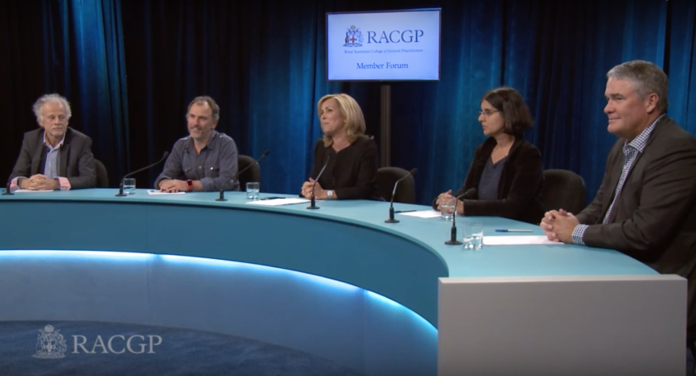
Hosted by TV journalist and radio broadcaster Ali Moore, the Royal Australian College of General Practice last week presented a new concept: an entertaining panel discussion with audience participation around topics such as funding of general practice and overuse of antibiotics.
I’ve made a selection of the live recorded discussion about the Medicare rebate freeze and the future of Medicare. The complete video is available below and on the RACGP YouTube channel.
Patients come first
“Our first and foremost responsibility is to our patients,” said RACGP president Dr Frank Jones, “and this is really the message from the College in the You’ve been targeted Campaign, because this is about the fact that we cannot sustain quality general practice under the present Medicare freeze.”
“This has galvanised general practice to more than I have ever experienced in my whole professional career, and feedback from our members tells us pre-budget there were 30 per cent of GPs about to change their billing rates, and it’s now over 60 per cent – that’s what our surveys tell us.”
“This is a real watershed for general practice
“This is a real watershed for general practice. What we need is a long-term vision for sustainable quality general practice in Australia and the College has to lead this because nobody else is.”
Is the GP worth paying for?
Dr Evan Ackermann: “Treasury wants to know why would I invest in general practice? What sort of outcomes are worth paying for? If you take that perspective then there are a lot of benefits that general practice does provide: we provide a lot of preventive healthcare, we’re providing the efficiencies in the health system that stop the hospital admissions, we’re the key drivers of the system for efficiency.”
“The model that we’ve had for funding general practice is gone
“The model that we’ve had for funding general practice is gone, and those days are not going to return. We’re going to have to start looking at paying for some services, we’re going to have to look at what patients really want and trying to get a model to fit that. In the future general practice is going to be key because of how we contribute to the whole health sector.”
The risk of loss of quality
Dr Rashmi Sharma explained that practices need to look at increasing fees, or they risk reducing the quality of patient services:
“Or we don’t take those steps to increase our fees but reduce our quality; so we don’t hire the extra nurse or we don’t actually teach anymore because it’s not cost-effective. I think those are the casualties that are a little bit more abstract and not so apparent in the immediate term, but actually the longevity and quality of general practice is what is at risk at the moment.”
“I certainly know that we’re going to put our fees up, and we’re going to explain that to our patients
“In terms of what it means to me: I certainly know that we’re going to put our fees up, and we’re going to explain that to our patients. I think it is about those conversations that you need to have and it is as simple as saying: ‘the reason that I bill you more on a Sunday is because I’m paying my receptionist time-and-a-half.’ That small business message needs to be out there.”
Conversations with patients
Dr Edmund Poliness about the Medicare rebate freeze: “For us it means a lot. I work with some of the most vulnerable people: I work at a homeless drop-in and at the Aboriginal community-controlled health organisation for Geelong. When a number of years ago the proposed five dollar co-payment came in we realised that we weren’t going to be able to afford to keep going. The five dollar co-payment went, but it has been replaced by the freeze and we’ve had to look at different ways of funding ourselves.”
“All those things cost money, they’re not free of charge
Dr Rashmi Sharma: “If you want quality, if you want a nurse to ring you up with the results, you want a recall system at your practice, all those things cost money, they’re not free of charge. It’s those conversations that you need to have with patients. The evidence is there that if we talk to them about smoking they eventually give up. Each time patients come to see you, you get those messages trough.”
“Let’s have the posters on the wall, let’s get the petition signed because that’s getting the conversation started. And if we fail in reversing the rebate freeze than that conversation will have to continue, and if we succeed, well that’s not the solution, it’s still a woeful rebate. If the rebate is unfrozen we shouldn’t stop that conversation.”
A new perspective on bulk billing
Dr Evan Ackermann about the longstanding habit of doctors to bulk bill: “It has been an ingrained culture. Ever since Medicare has been available the message was: you need to bulk bill, you need to bulk bill. That culture has changed overnight. It’s now: because you bulk bill that patient you’re supporting the moral hazard, you’re supporting more use of a valuable resource.”
“That bulk billing rate is actually a confusing indicator. We need to look at a series of indicators including patient out-of-pocket costs, not just the bulk billing rate, and that gives you a true picture of what is going on. That’s where we need to start getting the argument across to the community; the bulk billing rate does not mean good affordability or good access to general practice.”
